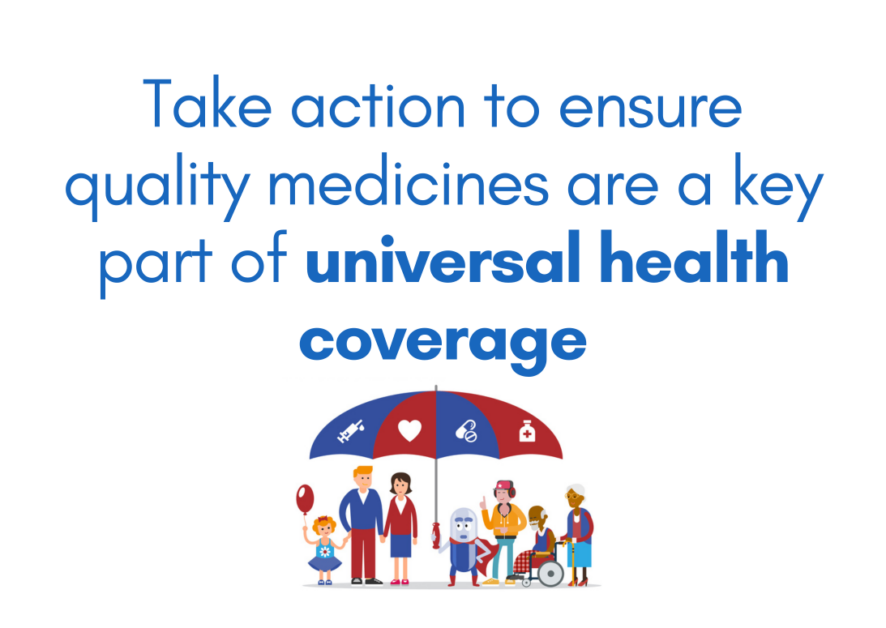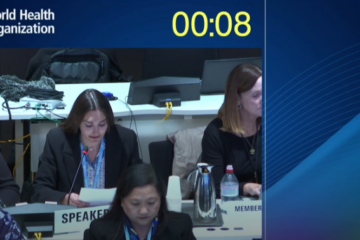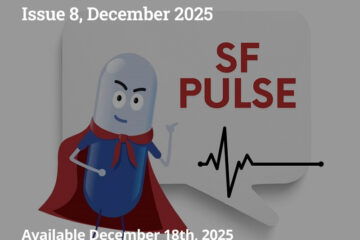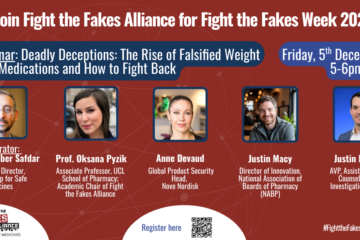
The head of WHO, Dr Tedros Adhanom Ghebreyesus, has said time and time again, global access to safe and quality medical products is a cornerstone of achieving Universal Health Coverage (UHC). The link between achieving Universal Health Coverage and substandard and falsified (SF) medical products must be made clear. Allowing substandard and falsified medical products to be produced and circulated in the global supply chain is an obstacle, if not a barrier, to achieving UHC.
Drug shortages and economic incentives can make falsifying medicines a very profitable criminal activity. This results in increased incidences of substandard and falsified medical products, which effectively hinder the availability of safe and quality medical products and threaten patient safety. Furthermore, the presence of ineffective and dangerous products undermines patient trust. Without confidence in quality, the uptake and use of healthcare products and services will be limited and UHC will be unattainable.
The news of cough syrups contaminated with diethylene glycol, an industrial solvent used in antifreeze and known to cause death ever since the 1930s, leading to over 300 child deaths, has shaken the world this past year. We ask: how many more victims until we act for justice? How much more burden can healthcare systems take?
This Call to Action urges everyone with the authority and capacity to take concrete action to prevent, detect, and respond to substandard and falsified medical products, along with the ingredients and materials that go into making them, in alignment with the priority areas from the World Health Organization Member State Mechanism on Substandard and Falsified Medical Products.
In this regard, the Fight the Fakes Alliance has identified actions to control and minimise the surge of substandard and falsified medical products and, thus, allow for safe and quality medicines for everyone:
1. PREVENTION
Ensure quality medicines are at the centre of Universal Health Coverage and health systems by implementing comprehensive policies to prevent substandard and falsified medicines, including adhering to standards for medical product quality, building global regulatory capabilities and strengthening regulatory systems, enhancing global cooperation, and creating economic incentives for product innovation and quality.
Public quality standards help ensure medicine identity, strength, quality, and purity, providing a benchmark against which to test medicines and assisting manufacturers in ensuring compliance with current good manufacturing practice (cGMP) requirements and applicable standards.
Regulators and regulatory systems —especially in low-income countries—may benefit from additional resources as well as training, skills, and knowledge development to provide more stringent oversight for medical products, thereby preventing substandard and falsified medicines from entering the market and reaching patients.
Initiatives designed to build partnerships across national regulatory authorities and industry can be critical to securing global supply chains. Information sharing, work sharing, and mutual recognition agreements are essential tools that facilitate greater access to quality medicines.
Financial or other economic incentives for product innovation and quality, such as investing in quality manufacturing and advancing global procurement policies and practices, help ensure that everyone can access quality-assured medical products and disincentivise the proliferation of substandard and falsified medicines.
2. DETECTION
Develop and implement national surveillance and traceability systems with appropriate regulations; streamline and simplify reporting of substandard and falsified medical products.
Surveillance and traceability systems provide information critical to detecting substandard and falsified medicines more efficiently. The WHO policy paper outlines the features of existing traceability systems and provides guidance on developing workable traceability regulations, a valuable guidance document. The Lagos Call to action for Africa Strategy for Pharmaceutical Traceability has already prompted many countries in Africa to move towards the adoption of existing global supply chain standards for pharmaceutical traceability.
Furthermore, it is key to adhere to the WHO Global Surveillance and Monitoring System through which Member States can improve the quantity, quality, and analysis of accurate data, including in the upstream supply chain starting with ingredients, concerning SF medical products, and to use that data in better prevention, detection, and response to those products, in order to protect public health.
Innovations in detection technologies can help link reporting in low- and middle-income countries to quality surveillance efforts. We recognise that reporting incidents or suspicious cases varies across countries and is sometimes burdensome, but also that both public and private sectors may fear repercussions. People may also lack understanding on even how to report incidents. Encouraging citizens, healthcare professionals, customs staff, and really anyone that has information on, or suspicion about a substandard and falsified medical product can speak up. The United Kingdom provides a great example of public involvement with a dedicated form and phone line for reporting these situations.
We call on you to make reporting the simple, routine, right, and NORMAL thing to do, because ultimately reporting can save many lives.
3. RESPONSE:
Increase collaboration with law enforcement and customs authorities.
Acting alone in the fight against substandard and falsified medicines can only bring limited gains, however by working together we can win the fight. Connecting the departments of healthcare, law enforcement, customs and trade on finding solutions means joining forces to protect citizens.
Existing initiatives and frameworks such as the MEDICRIME Convention which is a binding international instrument in the criminal law field on counterfeiting of medical products and similar crimes involving threats to public health, and the Lomé Initiative focused on African Countries, through which countries commit to act against the trafficking of substandard and falsified medical products, are some examples through which governments can stir up the fight. Join them!
The United Nations Convention against Transnational Organized Crime and the Protocols Thereto, as well as the much-awaited African Medicines Agency, for which a number of countries are yet to sign and ratify the treaty, are key to taking this fight forward.
In conclusion, while raising awareness about substandard and falsified medicines is an important step, it is often not enough to bring about meaningful change. This is why we issue this Call to Action: to motivate people in each of their abilities and roles to take concrete steps, rather than simply being passive observers.
The Fight the Fakes Alliance will continue to be an active partner in advocating against substandard and falsified medical products, in developing communication campaigns to raise awareness, in outlining opportunities for action, in facilitating cooperation among actors, in leveraging success stories, and in strengthening the capacity of organisations to fight the surge of substandard and falsified medical products.
If you would like to support this Call to Action, you can join as a signatory and send an email to Secretariat@FightTheFakes.org or by filling in the form.
Useful links:
- WHO Policy paper on traceability of medical products: https://www.who.int/publications/i/item/policy-paper-on-traceability-of-medical-products
- WHO Global Surveillance and Monitoring System: https://www.who.int/who-global-surveillance-and-monitoring-system
- Yellow Card: Making medicines and medical devices safer: https://yellowcard.mhra.gov.uk/contact-us
- The Lagos Call to Action for Africa Strategy for Pharmaceutical Traceability https://www.gs1.org/docs/healthcare/2019.Lagos/lagos-call-to-action-en.pdf (Under the coordination of the African Medicines Regulatory Harmonization (AMRH) and the New Partnership for Africa’s Development (NEPAD), 25 representatives from national and regional economic communities (RECs) from across Africa have signed a Call to Action for the “Africa Strategy for Pharmaceutical Traceability”. )
- MEDICRIME Convention: https://www.coe.int/en/web/medicrime/the-medicrime-convention
- The Lomé Initiative: https://www.brazzavillefoundation.org/en/our-actions/fight-against-medicines-that-kill/
- United Nations Convention against Transnational Organized Crime and the Protocols Thereto: https://www.unodc.org/unodc/en/organized-crime/intro/UNTOC.html
- African Medicines Agency Treaty: https://au.int/sites/default/files/treaties/36892-treaty-0069_-_ama_treaty_e.pdf
About Fight the Fakes Alliance: The Fight the Fakes Alliance (aka ‘Fight the Fakes’) is an inclusive multi-stakeholder association including partners from across the medicines supply chain, that aims to raise awareness and influence change about fake and substandard medicines. Membership of the Alliance is open to business and non-profit organisations, as well as academic institutions and youth groups. Private sector companies can join the Alliance as corporate partners via a separate membership scheme. Please contact secretariat@fightthefakes.org for further information.
Definitions:
Substandard also called “out of specification”, these are authorised medical products that fail to meet either their quality standards or specifications, or both.
Unregistered/unlicensed medical products that have not undergone evaluation and/or approval by the National or Regional Regulatory Authority for the market in which they are marketed/distributed or used, subject to permitted conditions under national or regional regulation and legislation.
Falsified medical products that deliberately/fraudulently misrepresent their identity, composition or source.
Supporting organisations
- Albert Figueras – Senior Lecturer, Freelance Consultant
- Antimicrobial Resistance Patient Alliance
- Association des Pharmaciens de MADAGASCAR (APM)
- Biosynse Health Institute
- Brazzaville Foundation
- Brightside Consulting
- CMCOMMS
- DOM ECC SUD-KIVU
- fulbridge.com
- GS1
- International Alliance of Patients’ Organizations
- IAPO Patients for Patient Safety Observatory
- International Council of Nurses (ICN)
- International Federation of Pharmaceutical Manufacturers & Associations
- International Federation of Pharmaceutical Wholesalers
- International Pharmaceutical Students’ Federation – African Regional Office (IPSF-AfRO)
- Iraqi Lipid Clinics Network
- LNS-Mali
- Medicines for Malaria Venture
- Partnership for Safe Medicines
- Poznan University of Medical Sciences, Poland
- PharmaSecure
- Pharmaceutical Society of Nigeria
- Solidsoft Reply
- Somaliland Quality Control Commision
- UCL Fight the Fakes
- Université La Source Conakry – République de Guinée
- U.S. Pharmacopeia
- World Alliance of Pituitary Organizations
- World Heart Federation


